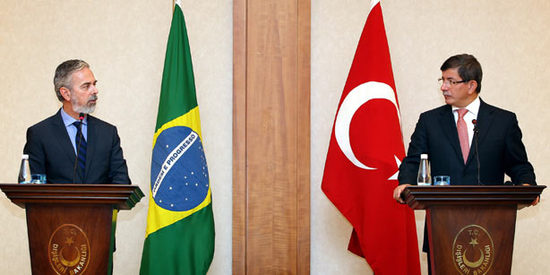Some of the arguments here draw on a paper presented by my colleague Guilherme Casarões at FGV in April 2013.
Brazil and Turkey have a lot in common – emerging powers with an ambition to project influence in their respective regions, they both desire to modify current structures of global governance. Even their historic trajectory is comparable – both were ruled by system-shaping strongmen in the early 20th century (Ataturk in the 1920s, Getulio Vargas in the 1930s), both suffered military coups in the 1960s, financial crises towards the end of the Cold War, and turned into emerging powers in the early 21st century. Their ambivalent identity vis-à-vis the West remains an important issue as both nations seek to define their place in the global system.
Turkey’s foreign policy strategy under Prime Minister Recep Tayyip Erdoğan has been quite astonishing over the past years, as I commented in a post in 2011. Erdogan has temporarily been wildly popular across the Middle East, and Turkey is bound to play a key role along with other emerging powers. In the same way, Brazil has begun to assume regional leadership more assertively over the past decade – a far easier enterprise given that South America one of the world’s most peaceful regions. There are thus further similarities between former President Lula and Prime Minister Erdoğan – who, not by chance, quickly identified opportunities to cooperate, a project that culminated in their attempt to negotiate a nuclear deal with Iran in 2010.
Turkey has identified Brazil as a key partner in the region, and it has undertaken a significant diplomatic effort to strengthen its presence in Brazil. The Turkish Ambassador to Brazil, Ersin Erçin, is a high-ranking diplomat who played a key role in Turkey’s accession negotiations with the European Union. His appointment reflects the importance Ankara now ascribes to Brazil. Erçin actively strengthens Turkey’s public diplomacy in Brazil, there is a visible Turkish-Brazilian Cultural Center and a Turkish high school in São Paulo. Turkish Airlines now offers multiple direct flights from São Paulo to Istanbul. The Turkish community in São Paulo has grown over the past years, albeit from a relatively small base. Dilma Rousseff’s third foreign visit was to Turkey (after Bulgaria and China). In January 2013, Patriota paid a much-commented visit to Turkey, symbolizing the importance Turks ascribe to Brazil.
Can one identify a common identity between Brazil and Turkey that may sustain their relationship in the future? From a constructivist point of view, there is plenty evidence for just that, given that their role in global affairs is so similar, and – more importantly – that both are vibrant democracies (despite criticism of Erdoğan’s authoritarian tendencies). Yet, Turkey cannot be easily be called a classic ‘rising power’. She argued that Turkey’s history also strongly differed from Brazil’s: It has been a member of NATO since the 1950s, and it has the one of the organization’s most potent military forces – another striking contrast to Brazil. It is also part of the OECD, a rich country club, since 1961. This raises the question in how far Brazil-Turkey relations are part of the “South-South” category in the first place.
From a realist point of view, Brazil and Turkey can be expected to jointly balance the United States – and their partnership will therefore last as long as their national interest is aligned. Yet realists would not expect a meaningful friendship beyond occasional and issue-based cooperation – such as in the financial G20.
Both Brazil and Turkey have, more recently, retreated somewhat from the international scene – faced with intense economic headwinds at home, President Dilma Rousseff cares less about foreign policy than her predecessor. Turkey, at the same time, has lost a bit of its reputation in the region as its ‘zero-problem’ strategy has run into difficulties.
Despite all the hype, one cannot fail to mention economic ties remain very weak – Turkey ranks as Brazil’s 41st most important trading partner. Considering that Turkey is among the world’s 20 largest economies, it shows how incipient ties still are. It remains unclear how much economic ties can strengthen since Brazil’s and Turkey’s economies are not particularly complementary. Brazil-Turkey relations are thus unlikely to worsen for any particular reason, but a common emerging power identity may not be enough to sustain the high-intensity friendship seen particularly during the final Lula years.
Read also:
For Brazil and Turkey, a Natural Defense Partnership Deepens
Turkey must reach out to Brazil’s new leader
Turkey’s complex case for UN Security Council reform
Photo credit: Anadolu Agency









